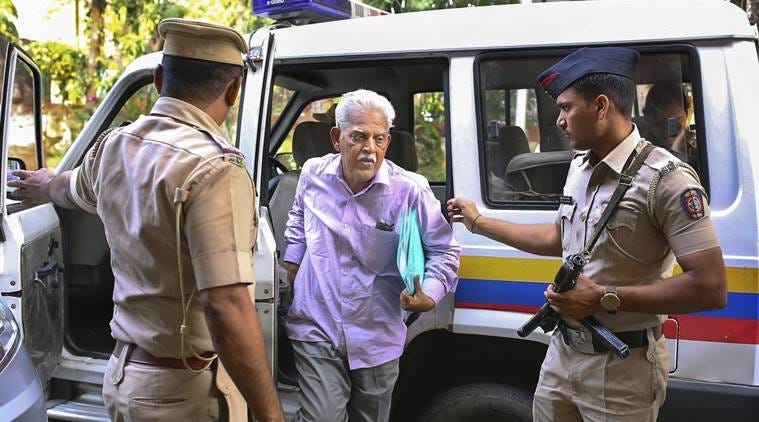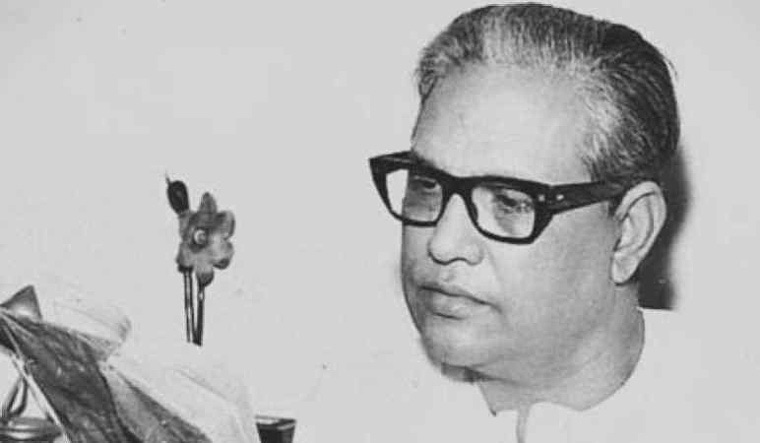
An 81-year-old poet and political activist falls critically ill in prison in the middle of a deadly pandemic, with no mercy from the powers-that-be. At any other time, this one sentence could be a potential Marquez plot. In July 2020, this is the reality of a country called India.
Varavara Rao, a renowned Telugu poet, activist and critic has been in prison since 2018 over flimsy evidence for his alleged role in the Elgar Parishad- Koregaon Bhima case of Maharashtra. Since May 2020, his condition has worsened. His family has appealed for bail five times, and for at least more information on Rao’s health. In both cases, their efforts have been thwarted.
Speaking to The Wire, Rao’s daughter spoke of how Rao seemed to be losing coherence in his latest phone call. “We got a call from him today and he barely spoke for a minute. He was incoherent and sounded unstable. One of his co-accused who has been assigned duty to take care of him had to step in and inform us that he needs to be urgently moved to a hospital for better treatment,” she said.
As I write this, social media is abuzz with the hashtag #FreeVaravaraRao and Rao’s family has released a statement asking for the government to “save his life.” But in keeping with the norm of our times, there’s danger of this hashtag and Rao’s story getting lost in the something-new-a-minute news cycle.
Hit ‘Refresh’ on Twitter and IG, and there are five other equally worthy and horrific things happening that we should be worried about. (Excluding the pandemic.) We’ve become so attuned to inviolably unfair things happening in the world, that scrolling past is our defense mechanism against losing our minds. And honestly, I get it. But something about living in a country where a poet is a political prisoner that the regime is afraid of, and doesn’t care about, is something I couldn’t shake off.
I looked to the Internet to find answers. Where else have poets been put in jail for speaking out in a powerful enough way that entire governments feel threatened? I found one famous example in India, of another time. In a newly-Independent India.

Majrooh Sultanpuri – beloved by most Hindi film fans for his legendary song lyrics – was arrested in 1949 for reciting a poem where he compared Jawaharlal Nehru to Adolf Hitler. As revolutionary a poet as they come, and a member of the Progressive Writers’ Movement, Sultanpuri reportedly recited this poem at a meeting for mill workers. Morarji Desai, the Governor of Bombay at the time, asked him to apologize. Sultanpuri refused, and spent two years in prison in Mumbai.
Another famous example, this time across the border. Faiz Ahmed Faiz was jailed many times for his poetry that threatened military dictator Zia-ul-Haq. Many years later, when his revolutionary poetry became a protest anthem in the anti-CAA protests in India, it threatened the powers-that-be again. (Or to be more specific, the IIT-Kanpur administration.)
Dig a little deeper into just these two poets, and their work, and you notice one stark similarity. They weren’t just poets, they were political activists, who through their words forcefully imagined a different world than the one they lived in. Poets, who were as much as political revolutionaries, but their choice of weapon was more powerful than weapons – words.
When a poet is jailed, in any country in the world, it’s a signal to the rest of us mere mortals that to imagine a better and a more just world is a crime. When a poet is jailed, we lose the authority to rebel against that which we believe to be unfair.
Because when a poet is jailed, it’s our freedom that’s at stake.
Links of The Week:
To Read:
Everything is fair game in Adityanath’s Uttar Pradesh as the recent Vikas Dubey “encounter” again confirms. Including journalists, who are routinely hounded by the government, as this report by Akanksha Kumar and Martand Singh in Newslaundry highlights. Read this story if you think journalism is only done in Delhi and Mumbai (it isn’t) and if you’ve ever wondered why India ranks so poorly when it comes to press freedom.
“Rawat, who started out in journalism over four years ago, is a stringer, as the army of journalists that Big Media relies on to report from outside major cities are known in newsrooms. He gets around Rs 50 per “input” such as a byte or a visual used in a story. On April 15, Rawat got a notice from Barabanki’s sub divisional magistrate denouncing his story as “completely wrong” and “baseless without any evidence”.
What does it mean to travel in a body that you’ve always been told isn’t meant for travel? I’d read anything by Roxane Gay, but this essay published on Medium was equally heartbreaking and delightful.
“Living in a fat body means you are in constant conversation with yourself, managing the anxieties that rise out of a fatphobic world that wants you to believe you don’t deserve to live a full and joyful life. Living in a somewhat less but still fat body means not knowing what your changing body is capable of and always doubting yourself.”
Like everyone I know, I get a bout of “what am I doing?” in these existential-crisis-ridden days. This blog by Austin Kleon is a reminder of why it’s important to just do the work in front of you.
“It is my 37th birthday today, and what I really crave, more than anything, is a continuity to my days. Not an accumulation, the sense that they’re adding up to anything, not necessarily, just a continuity. The sense that one day leads into another leads into another leads into another on and on and on. That they make some kind of chain.”
What would it feel like to be go back to an ordinary life? Adam Roy Gordon and his family went to Iceland (where there are almost no COVID-19 cases) from New York, and experienced a rare glimpse of the “old normal.” He writes about it in The Atlantic.
On the walk back from the playground with my son on my shoulders, I felt a hand touch my back. It was our Danish friend Peter, happy to run into us. This was the first physical contact I had had with someone other than my immediate family in more than three months. We asked him to give us some distance. We told him that we had tested negative but wanted to be extra cautious because of our travel. He was surprised and questioned the need for our masks. COVID-19 was over in Iceland, he said.
To Watch:
There’s nothing more than I enjoy than a good documentary, so here are some recommendations. (Until we wait for A Suitable Boy to hit our screens, that is.)
Athlete A on Netflix: Something is rotten in the state of US gymnastics. Wait, not something. Everything.
Behind the Curve on Netflix: There still are people in the world who believe that Earth is flat, and they are growing in number. I went in expecting to laugh constantly, but came away with the seriousness in gap when it comes to science communication.
A Suitable Girl on Netflix: A 2018 documentary about three women and how they navigate the eternal question of “Shaadi kab?” Well-made, and will make you cry.
That’s it from me for this week. I hope that by the next time I write to you, Varavara Rao will be a free man. Till then, you can read how he’s been writing poetry in jail for a while now, here.
As always, I’d love to hear from you — brickbats, and bouquets both. Just hit ‘Reply.’ If you know someone who would like this kind of thing once a week in their inbox, ask them to subscribe! If you have subscribed and are having trouble seeing this in your inbox, check your “Spam” folder.
I will write again soon.




